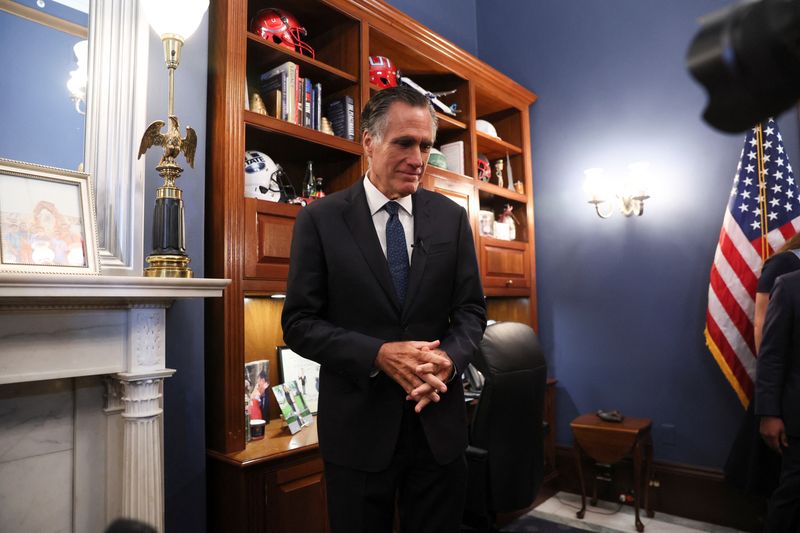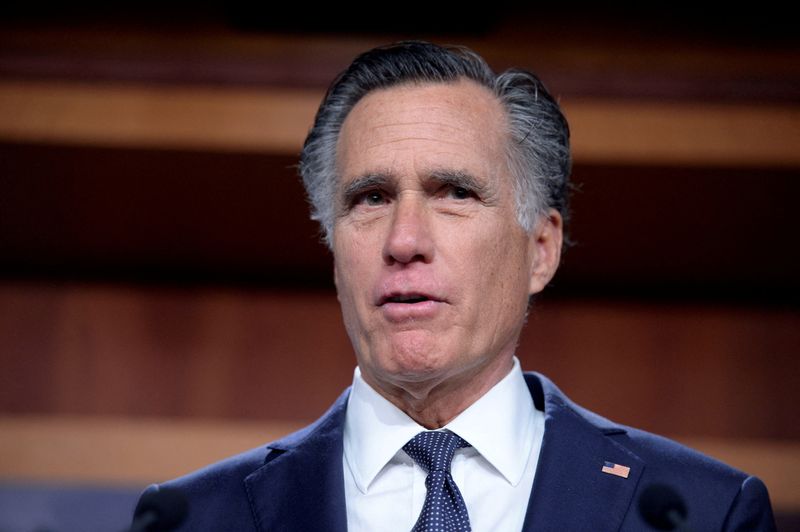By David Morgan and Moira Warburton
WASHINGTON (Reuters) -U.S. Senator Mitt Romney will not seek reelection in 2024, capping a roller-coaster ride through Republican politics from the height of his party's 2012 presidential nomination to the depths of tribal warfare in the age of Donald Trump.
Casting aside the hopes and appeals of colleagues, including Senate Republican Leader Mitch McConnell, the 76-year-old Utah Republican said on Wednesday he would retire as a one-term senator when his term ends in early 2025, rather than seek another six years among a dwindling number of Republican moderates in Congress.
Romney stood out within his caucus as a rare critic of former President Trump, but his decision to retire effectively surrenders his Utah Senate seat to a successor who could be more closely aligned with Trump and the hardline conservative politics of the state's other U.S. senator, fellow Republican Mike Lee.
Romney nonetheless said he believed it was time to go.
"At the end of another term I'd be in my mid-80s. Frankly it's time for a new generation of leaders," Romney said in a video statement. "While I'm not running for reelection, I'm not retiring from the fight."
The son of a former Michigan governor, auto industry executive and 1968 Republican presidential candidate, Romney became a multimillionaire in the private equity business and served as Massachusetts' governor before mounting an unsuccessful challenge against President Barack Obama as the Republican party presidential nominee in 2012.
As a U.S. senator since 2019, he has been an outspoken critic of Democratic President Joe Biden, but willing to work with the White House and Democrats on issues including infrastructure and gun control.
With Trump dominating the 2024 Republican presidential field, Romney has faced powerful headwinds at home in solidly Republican Utah. A Deseret News poll in June showed 47% of Republicans saying that Trump best represented them, compared with 39% who favored Romney.
Romney was the only Republican senator to vote to convict Trump at both his Senate impeachment trials.
Trump called the senator's retirement "fantastic news for America" in a social media post on Wednesday.
For his part, McConnell said in a statement that he was sorry to see Romney go, applauding him for making "remarkably efficient use of his brief tenure in the Senate."
SEEKING YOUNGER VOTERS
Romney said his post-Senate life will focus on bringing young people into politics.
"My party is only going to be successful getting young people to vote for us if we're talking about the future," he said, adding that he wished both Biden, 80, and Trump, 77, would step back from their presidential campaigns and let younger candidates run.
A poll in April from Reuters/Ipsos found that 61% of registered Democrats thought Biden was too old to run for reelection, versus 35% of registered Republicans who thought the same about Trump.
"President Biden said when he was running that he was a transitional figure to the next generation. Well, time to transition," Romney said on Wednesday.
Romney's departure contrasts with other leaders of the Senate, whose advanced age and ailing health have become concerns for their parties.
McConnell, 81, has struggled to fully recover from a concussion suffered in a fall and from other falls earlier this year. Democratic Senator Dianne Feinstein, 90, took weeks to recover from a bout of shingles in February and has repeatedly appeared confused during votes and hearings.
TRUMP-ALIGNED SUCCESSOR?
Retirement spares Romney from joining in what would have been a competitive primary if he had run again.
Although Brad Wilson, the Utah state House of Representatives speaker, has not declared his candidacy for Romney's seat, he has raised $2.2 million through an exploratory committee, including more than $1 million from individual donors, and boasts a slew of endorsements from state lawmakers.
Riverton Mayor Trent Staggs, a Trump supporter, has already declared his candidacy. Others, including former U.S. Representative Jason Chaffetz, are also seen as possible contenders for the Republican nomination.
McConnell, who has put a premium on Senate candidate quality in the 2024 election campaign, had urged Romney to seek reelection.
But Romney has shown little interest in backing away from his longstanding criticism of Trump as a candidate driven by "revenge and ego," urging Republican megadonors and influencers in a July op-ed to help narrow the 2024 presidential field in a bid to deny Trump the White House.

Romney, a fifth-generation member of the Church of Jesus Christ of Latter-Day Saints, or Mormon church, narrowly avoided censure by the Utah Republican Party over his opposition to Trump in 2021. Even so, he was booed and heckled onstage at a state party convention that year.
"I understand that I have a few folks that don't like me terribly much, and I'm sorry about that," he told the crowd. "But I express my mind as I believe is right and I follow my conscience as I believe is right."
